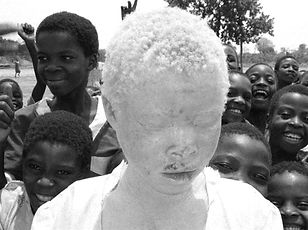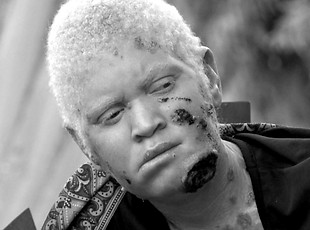

Impact & Oppression

Violence
Those with albinism in Sub-Saharan Africa live in fear of violence. Since 2006, more than 520 attacks on people with albinism in 28 countries have been recordedOnly 2% of those with albinism will live to see age 40.In some African societies, albinos can be targeted for their blood, hair and body parts as these can be worn as charms which are thought to bring prosperity.
-
Education: If children with albinism are lucky enough to survive, it is not likely they will be able to attend school. They will not be able to leave their homes, for fear that they will be kidnapped or killed for their body parts. They also suffer from low vision, making traditional education a challenge.
-
Social Participation: There is a great social disconnect that happens with this population. Many times they are shunned or exiled from a community, making social engagement nearly impossible. Even if they did branch out and speak to people they live in constant fear that they may be killed.
Exploitation
People with albinism are exploitated in various forms in Sub-Saharan Africa. As told by the personal story of Juma (2019), in the mid 2000's, people with albinism were kicked out of schools and sent to orphanages or shelters; some were forced into menial labor jobs. The division of rights in education and work settings is a form of exploitation by a group of people that dominates their authority over others.
-
Education: Children with albinism are often not allowed to attend school because of their skin pigmentation and negative beliefs towards them. These exploited children who are unable to attend school remain uneducated, unlike their fellow peers of different skin colors.
-
Employment interests and pursuits: Since many people with albinism are forced into their place of residence and work, they are usually unable to select employment that provides meaning to them. They are often forced to do menial labor and are treated unfairly in the workplace because of the discrimination that they experience.
Marginalization
Marginalization of people with albinism is seen in Sub-Saharan Africa through their denied access to jobs and forced menial labor. People with albinism experience injustice in their daily lives because of their lack of choice, voice, and opportunities, especially in the workforce. Marginalization and the restriction of employment affects many areas of people's lives.
-
Employment seeking and acquisition: People with albinism are often required to work menial labor jobs (servant work) and therefore they are not given opportunities to seek jobs of their interest. They're also often denied jobs because of the negative beliefs held toward them, such that they are considered a curse.
-
Financial management: When people are denied access to employment due to marginalization, it affects many aspects of their lives, especially their financial resources. Without employment, people cannot utilize personal fiscal resources, therefore they are left without money to buy food or other tangible necessities, and they are dependent on others for assistance.
Powerlessness
People with albinism in Sub-Saharan Africa experience multiple forms of oppression, including powerlessness. People exert power over them because of their albinism so they're disrespected and they lack a voice and ability to express creativity in work or social settings. The lack of power can affect them psychosocially; their sense of self, confidence, and freedom to safely engage in meaningful activities.
-
Job performance: Since many of these individuals are forced into a job without a choice or opinion, their job performance is likely affected. They're restricted from having a meaningful job that inspires creativity and enjoyment. Also, in cases where their limbs have been amputated, they might be unable to work without bilateral upper extremities.
-
Leisure exploration and participation: Individuals with albinism are powerless due to the oppression they face. Therefore, they are often restricted to pursue leisure activities or interests. Physical harm and amputations also affect leisure participation in activities that are meaningful to them. This lack of engagement can affect their sense of self and purpose in life.